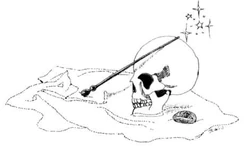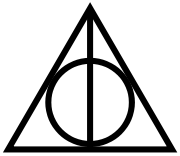
The three Deathly Hallows, which grants the one who unites all three the title of "Master of Death"
- "The true master does not seek to run away from Death. He accepts that he must die, and understands that there are far, far worse things in the living world than dying."
- — Albus Dumbledore[src]
The Master of Death (also known as Conqueror of Death, Vanquisher of Death and others[1]) is the one who has in their possession all three of the legendary Deathly Hallows, which are the Elder Wand, Resurrection Stone, and Cloak of Invisibility. While it is generally assumed that becoming the master of Death refers to some form of immortality, according to Albus Dumbledore and Harry Potter the true Master of Death truly accepts the fact that death is inevitable, and that there are other things much worse than death.[2]
History
There are two different beliefs concerning how the Deathly Hallows came to be. According to legend - as noted in The Tales of Beedle the Bard - they were created by Death himself as a reward to the Peverell brothers for having evaded him. However, according to Albus Dumbledore, they were probably made by the Peverells themselves.
The legend goes that in the 13th century, the Peverell brothers managed to trick Death himself by using magic to conjure a bridge to cross a dangerous river. Death stopped them because most travellers would have drowned. He offered them a reward each which was secretly a way to corrupt them and lead them to their deaths in another way. This was true in the case of Antioch Peverell, who was the original owner of the Elder Wand, and Cadmus Peverell, who was the original owner of the Resurrection Stone. However, while his brothers asked for something which gave them power, Ignotus Peverell asked for the Invisibility cloak so he could hide from Death. Ignotus eventually accepted that he must die and greeted Death as an old friend.
Over time, the Hallows fell into legend. Very few knew they truly existed and because of this, very few tried to search for them. Out of this sprung a legend which said that whoever united the Hallows by possessing all three at the same time would become The Master of Death. Many have incorrectly assumed that becoming the "Master of Death" will grant a form of immortality.
Known searches for the Hallows
- Ron Weasley: "When you say 'Master of Death' -"
- Xenophilius Lovegood: "Master. Conqueror. Vanquisher. Whichever term you prefer."
- — Xenophilius tells Harry, Ron, and Hermione about the Deathly Hallows[src]

The symbol of the Deathly Hallows: the line represents the Elder Wand, the circle the Resurrection Stone, and the triangle the Cloak of Invisibility
In their youth, both Gellert Grindelwald and Albus Dumbledore had been obsessed with the dream of uniting the Hallows and becoming the Masters of Death. Grindelwald managed to lay claim to the Elder Wand by stealing it from its previous master, Mykew Gregorovitch, but never found the other two Hallows. Albus Dumbledore and Harry Potter are the only known people to have held each of the three Hallows, although neither possessed all three simultaneously (the closest was Harry being the Elder Wand's master, though not in physical possession of it, while having both the Stone and the Cloak in his physical possession). Dumbledore regarded Harry as the "true master of death," not because of the fact that he had united the Hallows, but for truly accepting death and not fearing it.[3]
Known Masters of Death
- "You are the worthy possessor of the Hallows."
- — Albus Dumbledore talking to Harry Potter[src]
- Ignotus Peverell mastered only one of the Hallows, but accepted the inevitability of death, which would make him an honorary Master of Death as per Albus Dumbledore's interpretation of the title's meaning.
- Albus Dumbledore possessed all three Hallows, but not at the same time. He mastered the Elder Wand, borrowed the Cloak of Invisibility from James Potter before giving it to Harry during his first year at Hogwarts, and found the Resurrection Stone in the Gaunt shack. He accepted his own death, also qualifying for his own definition.
- However, it can also be implied as Dumbledore tried to bring his deceased family back with the help of Resurrection Stone so he didn't consider himself as true master of death because he felt he didn't accept death as inevitable.
- Harry Potter possessed all three Hallows and accepted his own death. First, he inherited the Cloak of Invisibility from his father, James. Then, he inherited the Resurrection Stone from Dumbledore, which was inside a snitch. Finally, he won the Elder Wand from Draco Malfoy during the escape from Malfoy Manor. Even though he did not physically own every Hallow at the same time – by the time he physically possessed the Elder Wand, he had left the Resurrection Stone behind in the Forbidden Forest - he employed the use of all three directly and indirectly when he allowed Lord Voldemort to kill him: He was wearing the Cloak, using the Stone, and killed by the Wand, which Harry had already won. However, the true master doesn't only unite the Hallows. The true master must accept he will die, and when Harry went to his own death willingly while directly and indirectly possessing the Hallows, he became the Master of Death because death never defeated him.
- All wands with Thestral tail hair cores, including the Elder Wand, will only work at their best for a wielder who has accepted death.[4] Thus, one would need to be an honorary Master of Death (per Albus Dumbledore's interpretation of the title's meaning) in order to wield any Thestral tail hair wand at its best.
Appearances
- Harry Potter and the Deathly Hallows (Mentioned only)
- Harry Potter and the Deathly Hallows: Part 1 (Possibly)
- Harry Potter and the Deathly Hallows: Part 1 (video game) (Possibly)
- Harry Potter and the Deathly Hallows: Part 2 (Possibly)
- Harry Potter and the Deathly Hallows: Part 2 (video game) (Possibly)
Notes and references
- ↑ Xenophilius Lovegood said that the person could use whichever term the person prefer.
- ↑ Interview with J.K. Rowling on Bloomsbury.com
- ↑ Harry Potter and the Deathly Hallows, Chapter 35
- ↑ JK Rowling Official Site, Archived Dec 8 2007
